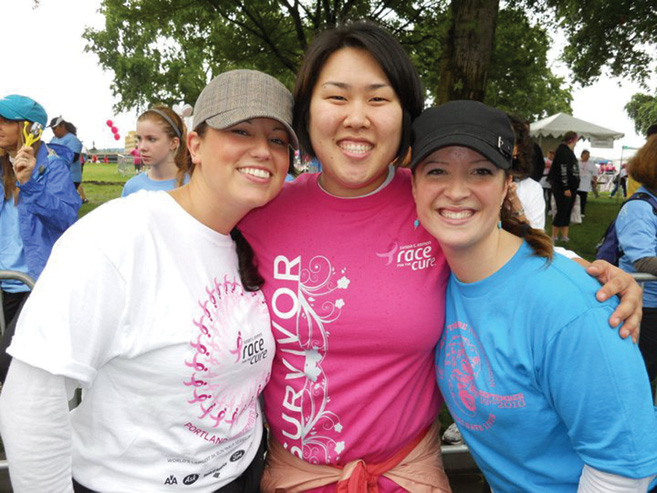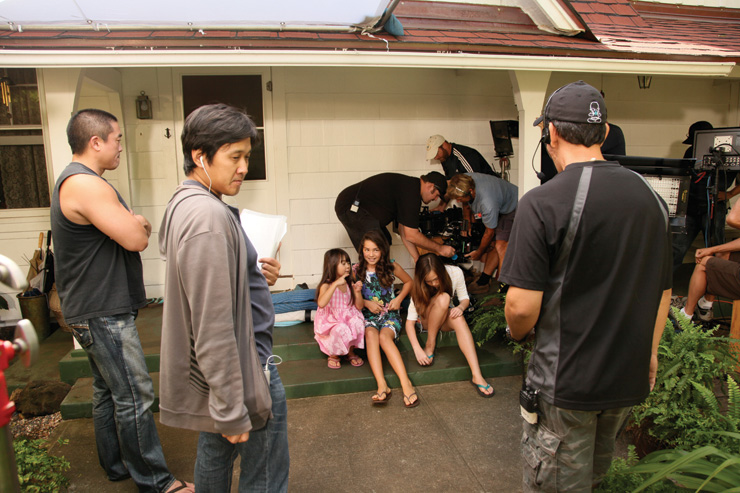Let’s Talk About Breasts
October marks Breast Cancer Awareness month, and one young woman wants you to know that early detection saves lives. It saved hers.
by Hannah Lee
I was 28 years old the day I felt a lump in my right breast. I remember that day like it was yesterday. Call it woman’s intuition or a gut feeling, but I knew right then that I had breast cancer.
The next couple months went by fast. Not only did I feel a lump, but also had bloody discharge from the nipple. Due to my young age and no family history, my doctor initially thought that I had an infection. When that “infection” never cleared up, he ordered a biopsy, and a few days later, I was told it was not breast cancer.
But, instead of feeling tremendous relief upon hearing the good news, I knew something wasn’t right and shared my doubts with my doctor. I would undergo a lumpectomy, and that test clearly showed what the earlier biopsy did not: The mass was large, as in seven centimeters. In terms of tumor size, this was big.
On March 31, 2009, my doctor confirmed what I had long suspected: breast cancer.
The next few weeks were filled with multiple appointments. I met with an oncologist, plastic surgeon, oncology nurse navigator and social workers, all of whom helped me through the process. I had to decide what course of action I was going to take to treat my cancer. My options included a mastectomy, radiation treatment or chemotherapy, along with breast reconstruction. My oncologist also went over my chances of recurrence if I chose not to have a mastectomy; it would mean increased medical screening on top of self-exams. Any unfamiliar lumps or anything “new” in future image tests would automatically lead to biopsies or lumpectomies. This was a lot of information to digest.
I educated myself with books, online resources and even met with other survivors. As helpful as it all was, I was still unsure of what to do. After much reflection, prayer and counsel from my closest friends, I chose to fight breast cancer with a mastectomy. That choice may have saved my life. The mastectomy revealed the actual size of my tumor was over eight centimeters. Given its large size, I was lucky the cancer had not spread.
When I first told my parents that I chose to have a mastectomy, they were concerned, first and foremost, about my health, but were also apprehensive because I did not have a boyfriend and had yet to marry. I didn’t admit it then, but there were times I shared that same sadness. What would my future husband think? What would his family think? Ultimately, I made a decision that stayed true to myself. I knew I was the type of person who had to fight with everything I had to stop cancer from taking my life. It definitely wasn’t easy, but my faith in God and the love and prayers I received from my family and friends helped to encourage me through those difficult times.
Little did I know, but their love and support would be a source of encouragement once more. Earlier this year, I felt lump in my left breast. A biopsy would confirm cancer, again. I chose to have another mastectomy and am currently recovering as I write and share my story with you.
But my story does not end here. The reason I am sharing my journey with cancer is so that you might see the life-saving importance of cancer screening and education. Self-breast exams have been a part of my life since I can remember, and it is what saved my life.

Yet, compared to other ethnic groups, Asian Americans have among the lowest screening rates. I am living proof that Korean Americans—even young ones like myself—are not invulnerable to this disease.
Regardless of language barriers, cost or lack of health insurance, we, as a community, need to make sure our sisters, daughters and mothers are taken care of. We all know moms are the backbone of our families. They always put others first and take care of themselves last, that is, if they do take care of themselves at all. This has to stop.
I know many of our families came to this country to live the American dream. For the majority of us, that means self-employment and no health insurance. But we cannot let this deter us from seeking medical advice or treatment. There are many institutions out there, such as the Susan G. Komen Foundation, that provide free mammograms and financial assistance. Many individuals and groups want to help. We need to find the courage and the humility to come together and ask for it, and to urge others to do the same.
Many of us, including myself, are children of immigrants who already serve as translators for our parents, and we need to make sure we pass on this important message to our mothers and sisters.
Sisters, I encourage you, right now, to become familiar with your breasts and get screened for breast cancer. Brothers, encourage the women in your life to do the same. Early detection saves lives, and as a cancer survivor myself, I cannot beat that drum loudly enough.
***
Hannah Lee writes from Beaverton, Oregon, where she enjoys the outdoors and playing in the rain. She recommends the following resources for more information on breast cancer and screening:
www.komen.org
http://www.rightactionforwomen.org/Financial-Support.php
http://www.nationalbreastcancer.org/about-breast-cancer/breast-self-exam.aspx
This article was published in the October 2011 issue of KoreAm. Subscribe today!
[ad#graphic-square]








